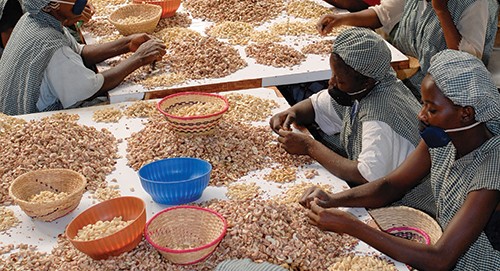The Tree Crops Development Authority (TCDA) – with the mandate of regulating and developing the production, processing and trading of tree crops – has hinted of instituting a special dispensation policy aimed at protecting local cashew processing companies.
Under the said policy, cashew processors will be guaranteed purchase of a certain ‘critical mass’ of raw cashew nuts (RCN) that will be enough to see the factories through the year before exporters are permitted to ship out the rest.
The CEO of TCDA, Williams Agyapong Quaittoo who disclosed this said: “In the yet-to-be approved tree crops regulation, we have included a provision that is meant to protect cashew processing plants. Every season, we will make an arrangement to help processors get access to enough RCN to feed their factories before any other persons”.
According to him, the regulation is under consideration by the TCDA Board of Directors and awaiting subsequent approval by Cabinet and parliament respectively. When passed, the regulation among others will also spell out the modalities to implement a new levy to be paid by exporters and processors of cashew, mango, shea, coconut, oil palm and rubber. The levy is expected to generate about US$10million in the first year.
Mr. Quaittoo was interacting with the B&FT on the side-lines of the maiden annual conference of Progressive Cashew Association of Ghana at Techiman in the Bono East Region.
He stressed the need for all stakeholders to rally behind the Authority to salvage the sinking cashew processing industry, saying: “We can’t depend solely on these foreigners who are buying our cashew for export. This is to protect all the actors along the cashew value chain”.
It is expected that the move will help ease the woes of cashew processing factories in the country. A litany of challenges, including non-availability of RCN, has forced many plants to close down; the few that are still business operate below their installed capacities.
For instance, one of the biggest defunct factories, Mim Cashew and Agricultural Production Limited at Mim in the Ahafo Region, shut down in 2020. The company’s closure has cost the jobs of over 1,000 workers – who were mostly women.
Reacting to the proposed plan to protect the factories, Charles Kwame Kuma, CEO of Nimdee Hyeren Company Ltd. – a small-scale processing factory at Sampa in the Bono Region, said it is an innovative and commendable initiative, but the issue has to do with the Authority’s ability and commitment to implement it to the letter as proposed.
Mr. Kuma further revealed that another pressing issue undermining the industry in the country is use of obsolete equipment, particularly among small-scale enterprises. He said the old machines are less productive and increase production costs, thus making the companies less competitive on the international market.
Depreciation of the local currency – the cedi – against major international trading currencies, he indicated, makes importation of state-of-the-art equipment a daunting task. He appealed for tax waivers on the importation of such industrial equipment to help revive the troubled cashew processing industry.
Officially, the 2022 cashew season is yet to be opened – but trading has already commenced across the major cashew hubs like Sampa, Wenchi, Techiman and Nkrankwanta. Usually, the season starts in late February to March, but the impact of climate change has forced the cashew season’s dynamics to change. Some farmers started picking the nuts around early January.
The minimum approved price by the TCDA for this season is GH¢5 per a kilogramme of RCN. Currently, the farm gate price is GH¢6-GH¢6.50, while the ‘delivery to warehouse’ with less moisture content goes for GH¢6.60-GH¢7.










